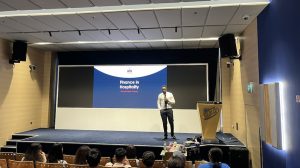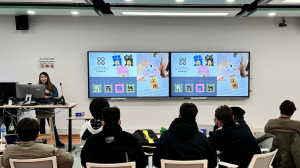A study involving 2 researchers connected to IFT says that in the service sector not all employee smiles are equal. The findings suggest that customers are more likely to forgive a service provider’s misstep – such as a drink spilt on a client by table-waiting staff – if the employee at fault is a male and makes his apology in a certain manner. Specifically, a ‘sorry’ is more likely to be accepted if the generic male service worker offers a smile that displays his ‘crow’s feet’, i.e. the fine lines and wrinkles around his eyes.
For their study, the researchers used data collected from eye-tracking technology applied to 112 IFT students that were individually asked to imagine they were a service customer. They were then shown a scene on a computer portraying a service slip-up and subsequent ‘apology’ by the person making the ‘mistake’. The apology sequence involved the ‘wrongdoer’ smiling. A variety of smiles was tried out, delivered by males and females posing as employees. Some smiles involved eye expression, some involved movement of the mouth, and some employed movement of the head.
The students playing the part of customer were then asked about their likelihood of forgiving the employee.
The study was conducted by IFT Lecturer Dr. Henrique Ngan and Ms. Joanne Yu. The latter at the time was an undergraduate at the Institute. The duo’s conclusions were featured in the paper “To smile or not to smile – an eye-tracking study on service recovery”, published last year via the online version of the academic journal Current Issues in Tourism.
“Not all smiles are processed equally” by consumers, wrote Dr. Ngan and Ms. Yu. “As found in our study, there are different types of smiles that influence customers differently.”
The research results indicated that “the degree of mouth movement and the gender of the service worker were crucial factors” in the customer forgiving the service blunder. In addition, eye-tracking data revealed that the longest gazes by those participants acting as ‘customers’ were fixed on those ‘wrongdoers’ who showed their teeth when smiling, and where the smiles they gave produced crow’s-feet wrinkles, the researchers wrote.
Gender bias
The study findings revealed that the likelihood of both male and female customers forgiving a worker involved in an instance of service failure and attempted recovery was highly influenced by the gender of the employee. ‘Clients’ in the study had overall a higher tendency to forgive a male staff member than a female one.
Dr. Ngan and Ms. Yu noted – based upon studies by other researchers – that customers usually had a higher expectation that a female staff member would issue an apology under those circumstances than they had that a male staff member would do so.
“Consequently, women’s apologies might be a social norm for the customers,” they stated. The authors recalled that past research indicated that the lower the perceived likelihood a particular ‘offender’ would say ‘sorry’, the higher the effectiveness of any such apology when actually delivered.
“In the present study, participants were less likely to forgive a female service representative, since women… are expected to apologise more and make more effort to maintain [a] positive relationship with the customers,” Dr. Ngan and Ms. Yu suggested.
The social advantage that accrued to male employees in such a situation compared to female staff was not immutable. A female worker smiling in a certain way could also prove winning with some clients. The researchers’ data indicated that male customers were more likely to forgive an instance of service failure and accept an act of recovery if the scenario involved a female staff member who then smiled with teeth showing.
“One possible reason is that men are drawn to a woman’s lips more than any other facial features,” the researchers stated. “Lips indicate youth and fertility in women, and it is difficult for men to look away especially when women wear lipstick,” they added.
Dr. Ngan and Ms. Yu also noted that “the activation of the muscles around the eyes alone is not significant to influence a person’s likelihood to forgive the service representative. Only when manner of smile and gender of supplicant were considered in tandem, did the type of smiled apology become “much more significant” in its effects, the researchers observed. They added that customers were overall more likely to forgive a male staff member whose smile displayed crow’s-feet wrinkles.
The researchers pointed out that their conclusions could be useful for companies, not only in terms of recruitment and selection of staff, but also for development of training programmes.
“The gender of the staff exhibiting the smile as well as the gender of the customer should be taken into consideration,” Dr. Ngan and Ms. Yu wrote. Depending upon the predominant gender of the customers in the target market, service firms might wish to choose “tactfully” whether they allocated male or female staff to take care of those customers, the authors noted.
More info
Ms. Joanne Yu Chung-En is an IFT graduate. Ms. Yu – who came from Chinese Taiwan to study at the Institute – completed her bachelor degree in Tourism Event Management in academic year 2017/18. In 2018, she won 2 international awards for academic research produced under the supervision of Dr. Ngan. She received an award for best presentation at the 7th International Conference on Industrial Technology and Management, at Oxford University in the United Kingdom. She was additionally awarded second place in the “Best ICT Paper” category at the 6th International Student Conference in Tourism Research, hosted by IMC University of Applied Sciences Krems, in Austria.
https://doi.org/10.1080/13683500.2018.1502260









